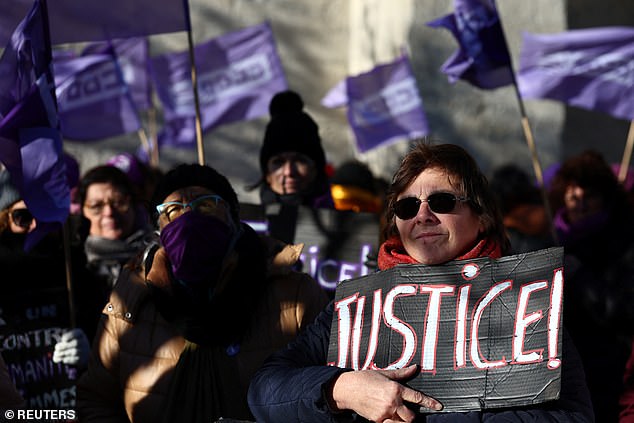For almost a decade in the sleepy southern French village of Mazan, Dominique Pelicot kept a shameful secret about what he did at night.
In the light of day, the 72-year-old who enjoyed cycling and painting was a regular family-man: a devoted husband and father of three who his wife, Gisèle, called a ‘super guy’.
But in private, the retired electrician led a double life fuelled by countless hours spent on an anonymous online chatroom – Coco – where he solicited dozens of strangers to come to his house and rape his unconscious wife who he had drugged asleep.
Coco and its rape-fantasy forum – called ‘without her knowledge’ – was shut down by authorities last year and its founder, software engineer Isaac Steidl, was arrested in January. But multiple other online communities exist where users are free to express their most twisted sexual desires.
In fact, the depraved platform has already been replaced with a copy-cat site: Bounty.chat. The website claims to cater to a range of fetishes – including BDSM, cross-dressing, and in a grim-echo of the Pelicot case, candaulism: when a man exposes his female partner, or images of her, to others for their voyeuristic pleasure.
French authorities are already on a mission to shut down the platform, suspecting it of exposing minors to ‘pedophile content’ and solicitation. But the global and growing problem stretches beyond France, with men from all over the world engaging in what has been dubbed ‘virtual rape’ by countless victims.
‘Women are literally not safe anywhere’ was the conclusion of one Serbian woman, who last year uncovered the existence of multiple Telegram groups where men shared photos of their own mothers, sisters and aunts for other users to sexualise and numerically rate.

Coco, the unmoderated, free-to-access online chat forum where Dominique Pelicot invited men to rape his unconscious wife

The four-month public rape trial of Gisèle Pelicot shocked the world, exposing an epidemic of sexual violence with the 72-year-old French woman emerging as an icon of bravery

Dominique Pelicot was sentenced to 20 years for drugging and raping his wife, and inviting dozens of strangers to his home to violate her for almost a decade
One of the largest groups uncovered by the feminist activist Stasa Ivkovic had 70,000 members, where around 10,000 messages were sent daily. The chats were not only full of sexually explicit photos of women shared without their consent as revenge porn, but also included upskirting pictures taken on public transport. Telegram removed this group in early 2025.
The anonymous group administrators would receive submissions, often of underage girls (tagged with the code -18), and sell them to users for around 50 euros. When the chat owners judged they had made sufficient money from the victims, they would then share the content publicly for free.
In one disturbing instance, footage of a rape was shared in a Telegram group, with the victim only learning about its existence after it was seen by hundreds. The video later ended up on a pornographic website but was quickly deleted.
The encrypted instant-messaging platform Telegram was also at the centre of a sickening German investigation, which uncovered the existence of multiple ‘rape chats’ where men would exchange tips on how best to sedate and sexually assault the women in their households.
Undercover journalists from German broadcaster ARD infiltrated the groups and discovered how men shared instructions on how to rape their wives, partners, sisters and mothers. Live footage of the attacks and images of incapacitated women passed out on beds circulated widely, attracting praise from other users.
In one message, a man shared a photo of his sister-in-law and her sister, writing: ‘Someone has advice and suggestions on how to get them heavily drugged?’ Others shared derogatory messages about the women in their lives. ‘The wife swears she’s never had anything in her arse. We know different, don’t we?’
Some posted links to online shops where abusers could purchase sedatives disguised as hair products. The investigative team was able to buy one of the products and had it tested by a toxicologist, who found it was a combination of animal anaesthetic, tranquilizer, and a compound to prevent vomiting.
Telegram said it removed these groups in December 2024 ‘as soon as we became aware of them’. The platform insisted it would take action against any group that misuses its platform, adding that ‘all users caught doing so will be blocked immediately’. But when chats were shut down, members were only sent links to new ones.

A sketch of Dominique Pelicot with his lawyer Beatrice Zavarro at the courthouse in Avignon, France, December 16, 2024

The court convicted Dominique Pelicot alongside 50 other men, mostly on rape charges, who took part in Gisele’s violation in her home in Mazan, France
The Cambridge-based Internet Watch Foundation (IWF) said it had flagged 2,294 examples of child sexual abuse imagery on the messaging app since 2022. Some of the images included children as young as two years old, and a third were rated as category A – the worst forms of abuse. Telegram said it has always removed all child abuse imagery reported to it by the IWF and established a formal partnership with the group in December 2024.
The platform’s Russian-born billionaire founder, Pavel Durov, was arrested by police in France last summer. He was charged with allegedly allowing criminal activity on the app and faces a potential 10-year prison sentence. He has been released with bail set at five million euros (£4.3 million).
But even as the founder faces scrutiny, sexually illicit content continues to run rampant on the messaging app.
This year, it was revealed that hundreds of secretly filmed images of women were shared in a Chinese-language Telegram chat called ‘Mask Park Treehole Forum’, with more than 100,000 subscribers. In some cases, men shared intimate photos of their ex-girlfriends and even family members. In others, they got the footage from pinhole cameras hidden in public places and toilets.
Telegram removed this chat in March 2025. However, once a sexually graphic image is circulating online, it’s notoriously difficult to eradicate it from the internet. The UK’s Revenge Porn Helpline helped to remove 81,000 sexually explicit images last year, but 61,213 previously reported photographs continued to circulate online. The painful phenomenon – known as re-victimisation – rose by 260 percent in 2024.
And with the rise in deepfake technology – manipulated images that use AI to superimpose the face of one person onto the body of another – it’s harder than ever for women to protect themselves.
CNN journalists this year uncovered at least a dozen Telegram chats, also in China, where men shared deepfake porn they had made at home using photos of their female colleagues plucked from social media.
Men are able to make the porn from their phones with the help of thousands of China’s unregulated, unregistered AI platforms, including ‘one-click’ undress apps (which simulate the removal of clothes of an individual in an image) and instant face swapping software. There’s even a voice-cloning app called ‘Many of You’ which can create hyperrealistic audio deepfakes.

Telegram’s Russian-born billionaire founder, Pavel Durov, was arrested by police in France last summer

The rise in deepfake technology – manipulated images that use AI to superimpose the face of one person onto the body of another – means it’s harder than ever for women to protect themselves

People gather in support of Frenchwoman Gisèle Pelicot, the victim of a mass rape orchestrated by her then-husband Dominique Pelicot at their home in the southern French town of Mazan, in December 2024

Doctored images of Italian Prime Minister Giorgia Meloni and her sister, Arianna, circulated on a pornography website
Watchdogs recently dealt with compliance issues with some 3,500 of these sophisticated AI products, but research suggests a myriad of platforms still exist. Telegram said it removed the Chinese deepfake groups in early August 2025.
No woman is immune from the increasingly sophisticated technology, including Italian Prime Minister Giorgia Meloni who recently voiced her disgust after doctored pictures of her and other prominent women appeared on a porn site.
The platform, called Phica, whose name is a play on a vulgar Italian slang term for female genitalia, was taken down late August after amassing some 700,000 subscribers.
The internet abuse scandal rocked Italy, with scores of women denouncing the platform for facilitating ‘virtual rape’. Some are seeing the storm as a potential #MeToo moment, although one leading lawyer has warned that many victims feel too trapped or intimidated to press charges.
In South Korea last year, deepfake technology caused a national crisis when more than 500 schools and universities were identified as targets in an industrial-scale operation.
Sexually explicit, doctored photographs of girls began circulating in countless Telegram groups across the country. The victims ranged in age – from minors in middle school to women in university – but most of the perpetrators were their classmates.
It was revealed that teenage boys were mining their female peers’ social media accounts and school yearbooks, gathering the images necessary for the deepfakes. They then created ‘Humiliation Rooms’ dedicated to circulating the digitally-manipulated pornography.
‘Every minute people were uploading photos of girls they knew and asking them to be turned into deepfakes,’ South Korean journalist Ko Narin, who exposed the scandal, told the BBC.

South Korean activists participate in an anti-deepfake rally to respond to deepfake sexual violence on September 6, 2024

Activists hold posters reading ‘Repeated deepfake sex crimes, the state is an accomplice too’ during a protest against deepfake porn in Seoul on August 30, 2024

The UK’s Revenge Porn Helpline helped to remove 81,000 sexually explicit images last year, but 61,213 previously reported photographs continued to circulate online
Investigations to infiltrate and take down the rooms uncovered horrifying hazing rituals, with young people even sharing indecent images of their own family members to gain access to the illicit groups.
Bots within the Telegram app itself allowed users to generate AI nudes in only a matter of seconds. One such bot had amassed more than 220,000 subscribers, offering users deals like two images free of charge.
Telegram apologised to South Korean authorities for its handling of the scandal, and took measures to delete the illicit images. But even though a lot of the groups were deleted, new ones sprung up, including a ‘Humiliation Room dedicated to Ko, the very journalist who broke the story. ‘I keep checking the room to see if my photo has been uploaded,’ she told the BBC last year.
Ofcom, the independent regulator for the UK’s communications industries, is currently investigating nine online services over suspected failures to protect users from illegal content after new regulations introduced in March. The platforms include an unnamed suicide forum, the controversial website 4chan, and seven file sharing services which they think may be perpetuating the circulation of child sexual abuse imagery.
Failure to comply with Ofcom’s regulations can result in a fine up to £18 million, or 10 percent of a company’s qualifying worldwide revenue, whichever is greater. Criminal action can also be taken against senior managers who fail to ensure companies follow information requests from the regulator.
Wherever in the world an online service is based, it still has a duty to protect UK users from illegal activity – such as extreme sexual violence and child sexual abuse – if it has a significant amount of UK users or the UK is part of its target audience.
Sharing or threatening to share pornographic deepfake images without consent is illegal in England and Wales. However, despite existing laws, the government predicts that some eight million doctored photos will be shared in 2025 – up from 500,000 in 2023.
It remains to be seen whether regulators, lawmakers and the police can keep pace with the shadowy workings of instant-messaging apps and the increasingly sophisticated generative AI tools, now available to all in only a few clicks.
A spokesperson from Telegram told the Daily Mail: ‘Everything mentioned in the article was removed as a small part of Telegram’s everyday moderation efforts. Illegal pornography, including non-consensual and deepfake porn, is explicitly forbidden by Telegram’s terms of service and is removed whenever discovered.
‘Moderators empowered by custom AI tools proactively monitor public parts of the platform and accept reports in order to remove millions of pieces of harmful content each day, including illegal pornography.’











